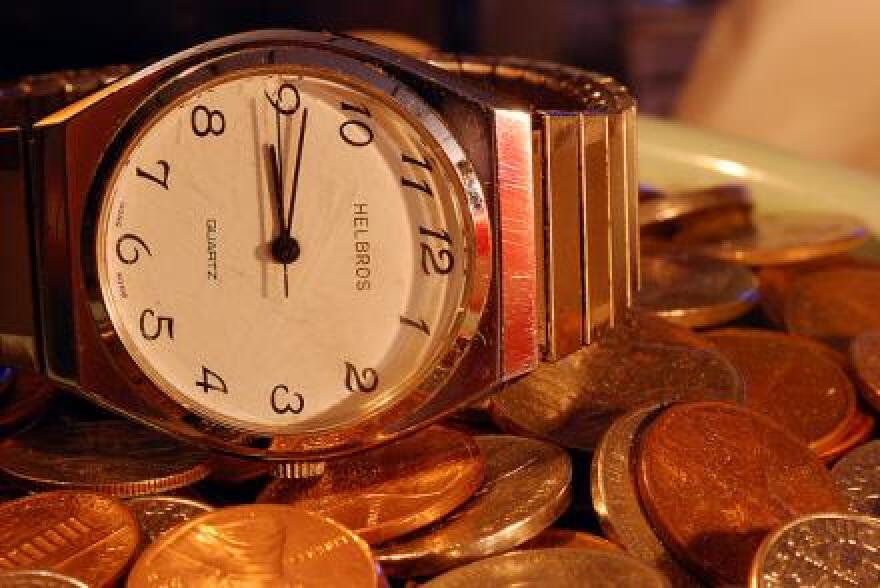Frieda Kipar Bay is an herbalist. She teaches workshops on growing herbs for medicine. A class like this might normally cost $50-$60, but at a recent workshop at the Homestead Skillshare Festival, at Hayes Valley Farm in San Francisco, students didn’t pay a dime.
The day-long gathering – which included 40 different workshops, food, and live entertainment – was funded with a different kind of currency: hours. These transactions are managed by the Bay Area Community Exchange Time Bank.
“Everybody’s hour is equal,” says Mira Luna, a founder and organizer of the Time Bank. “So, for example, I do an hour of massage for somebody and then I get an hour credit to then get an hour of plumbing from somebody else. If I spend two hours, then I get two hours credit, and so on.”
Luna says the time bank makes good financial sense, given the hectic nature of urban life and the current economic climate. Beyond this, she says it’s also about building trust through personal interactions. She notes that money is in effect anonymous: “We can’t tell where that money has traveled, how people have earned it, whether they’ve earned it in integrity or through exploitation. But you can actually tell where all of your hours were earned on the time bank. It’s all very transparent.”
John Trautwein, who paid two hours to attend the festival, appreciates the community-building aspect of the time bank. He says he’s earned most of his hours by giving rides in his car.
“If I think about what life really means to me,” he says, “it’s more about taking the time to go in my community and use this way to meet people. To really get outside of the money system really brings me a lot of fulfillment.”
While the time bank may seem like a new concept, it’s actually kind of a throwback. During the Great Depression, Oakland had an Unemployed Exchange Association. It helped thousands of members meet basic needs without the use of money. Our own great recession has inspired modern approaches to this idea, like rideshares and donation-based services. What makes today’s sharing economy different from previous generations is access to the world’s largest marketplace: the Internet.
Luna calls the Time Bank website “a mix between Facebook and Craigslist, with a reputation system built in.” Member profiles on the site list all past exchanges, along with comments. Along with showing the types of services someone has given or received, these comments also act as a kind of review system. Just as on a site like Yelp, these reviews can help a member build a good reputation. Luna points out that while most online transactions are backed by what is essentially trust in the federal government, Time Bank transactions are backed by “trust in community.” This trust seems to be spreading. The time bank recently reached 1,500 members, from throughout the Bay Area.
Luna says there has only been one real problem over the two and half years the Time Bank has been operating: a dispute over a missed appointment turned contentious, which resulted in a member voluntarily leaving the time bank. Luna says that since you can’t really get rich from saving up time dollars, the incentive to manipulate the system is lessened. “And it’s very transparent,” she says. “So if anyone is doing something wrong it becomes immediately obvious.”
As with any other bank, sticky situations do come up, like going into debt. Users are allowed to receive more hours than they give – up to 25 – before the system is flagged. Time Bank administrators will then contact the member to see if they need help spending or earning, but they won’t stop that person’s account.
Time Bank member John Trautwein says he is not convinced that people can handle these kinds of issues without explicit checks and balances in the system. He says carrying debt is already ingrained into our economic culture, and that this new model won’t necessarily fix that.
“I think it’s still going to come up with the same exact challenges that our current economic system has, because in the end it still is an economic system,” he says.
Despite these possible issues, Luna says she hopes to see alternative economic models like the time bank become more prevalent. She is optimistic, but also realistic about their place in the current economy.
“To the extent that people drop out of the mainstream system and stop supporting national corporate businesses, then we’ll be able to use the time bank more,” she says. “But it is dependent on that because most people are dependent on these.”
At the all-volunteer-run Homestead Skillshare festival, plenty of folks were trying to be less dependent on these mainstream systems, from a sauerkraut fermentation class in a garden shed, to a cartography lesson, to the outdoor oven-building class. Happily, they found a place where time really is money.
This story originally aired on July 24, 2012.
Click here for more stories in our series on The Sharing Economy.


